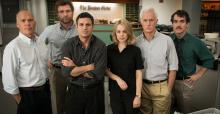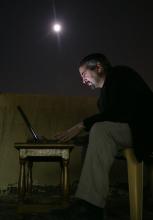boston globe

Early in the film Spotlight, about the Boston Globe investigative reporting team that exposed the decades-long cover-up of sex abuse by Catholic church leaders, a Globe reporter is shown at Mass with her grandmother. The priest, launching his homily, says, “Knowledge is one thing. Faith is another.”
In a simplistic film, this binary statement might set the tone for a black-and-white portrait of journalists as pure heroes and people of faith as solely hypocrites and worse. But Spotlight works with characters not caricatures; not one-dimensional heroes and villains, but real people who sometimes choose expediency and sometimes courage. No one is shown to be flawless, not even the reporters and editors who do great good in bringing to light systemic crimes.
But the movie does illustrate quite clearly one tension between knowledge and faith: The guardians of institutions, including churches, can fear knowledge to the point of pathology.

Late last Thursday evening, getting one final fix of news before going to bed, I saw it. Anthony Shadid, the New York Times correspondent and Beirut bureau chief, had died from an asthma attack while ending a clandestine reporting trip into Syria. He apparently suffered the attack in a reaction to horses being used by smugglers helping him and a photographer leave the country.
When you read the news as much as I do, you learn which bylines to look for if you want the most comprehensive and well-written coverage of a story. Mr. Shadid was one of those correspondents.
In a career that included stints with the Associated Press, Boston Globe, Washington Post, and The Times; Mr. Shadid covered one of the most dangerous parts of the world — the Middle East. He was shot in the West Bank in 2002, kidnapped and beaten in Libya in 2011. He won two Pulitzer Prizes, in 2004 and 2010, for his reporting on the Iraq war; and has been nominated by The Times for a 2012 prize.

This comes after a Supreme Court decision in May that ordered California to reduce its prison population, as overcrowding was causing "needless suffering and death."
Part of what's making the standoff worse is the belief that the strike is, in essence, a form of gang activity. For one thing, as Colin Dayan noted in passing in a New York Times op-ed, "How they have managed to communicate with each other is anyone's guess." The California Department of Corrections and Rehabilitation (CDCR), though, isn't so stumped.